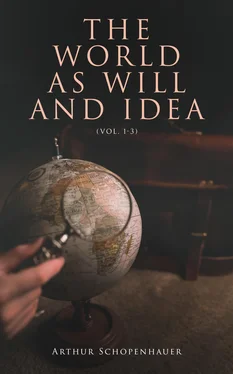§ 49. The truth which lies at the foundation of all that we have hitherto said about art, is that the object of art, the representation of which is the aim of the artist, and the knowledge of which must therefore precede his work as its germ and source, is an Idea in Plato's sense, and never anything else; not the particular thing, the object of common apprehension, and not the concept, the object of rational thought and of science. Although the Idea and the concept have something in common, because both represent as unity a multiplicity of real things; yet the great difference between them has no doubt been made clear and evident enough by what we have said about concepts in the first book, and about Ideas in this book. I by no means wish to assert, however, that Plato really distinctly comprehended this difference; indeed many of his examples of Ideas, and his discussions of them, are applicable only to concepts. Meanwhile we leave this question alone and go on our own way, glad when we come upon traces of any great and noble mind, yet not following his footsteps but our own aim. The concept is abstract, discursive, undetermined within its own sphere, only determined by its limits, attainable and comprehensible by him who has only reason, communicable by words without any other assistance, entirely exhausted by its definition. The Idea on the contrary, although defined as the adequate representative of the concept, is always object of perception, and although representing an infinite number of particular things, is yet thoroughly determined. It is never known by the individual as such, but only by him who has raised himself above all willing and all individuality to the pure subject of knowing. Thus it is only attainable by the man of genius, and by him who, for the most part through the assistance of the works of genius, has reached an exalted frame of mind, by increasing his power of pure knowing. It is therefore not absolutely but only conditionally communicable, because the Idea, comprehended and repeated in the work of art, appeals to every one only according to the measure of his own intellectual worth. So that just the most excellent works of every art, the noblest productions of genius, must always remain sealed books to the dull majority of men, inaccessible to them, separated from them by a wide gulf, just as the society of princes is inaccessible to the common people. It is true that even the dullest of them accept on authority recognisedly great works, lest otherwise they should argue their own incompetence; but they wait in silence, always ready to express their condemnation, as soon as they are allowed to hope that they may do so without being left to stand alone; and then their long-restrained hatred against all that is great and beautiful, and against the authors of it, gladly relieves itself; for such things never appealed to them, and for that very reason were humiliating to them. For as a rule a man must have worth in himself in order to recognise it and believe in it willingly and freely in others. On this rests the necessity of modesty in all merit, and the disproportionately loud praise of this virtue, which alone of all its sisters is always included in the eulogy of every one who ventures to praise any distinguished man, in order to appease and quiet the wrath of the unworthy. What then is modesty but hypocritical humility, by means of which, in a world swelling with base envy, a man seeks to obtain pardon for excellences and merits from those who have none? For whoever attributes to himself no merits, because he actually has none, is not modest but merely honest.
The Idea is the unity that falls into multiplicity on account of the temporal and spatial form of our intuitive apprehension; the concept , on the contrary, is the unity reconstructed out of multiplicity by the abstraction of our reason; the latter may be defined as unitas post rem, the former as unitas ante rem. Finally, we may express the distinction between the Idea and the concept, by a comparison, thus: the concept is like a dead receptacle, in which, whatever has been put, actually lies side by side, but out of which no more can be taken (by analytical judgment) than was put in (by synthetical reflection); the (Platonic) Idea , on the other hand, develops, in him who has comprehended it, ideas which are new as regards the concept of the same name; it resembles a living organism, developing itself and possessed of the power of reproduction, which brings forth what was not put into it.
It follows from all that has been said, that the concept, useful as it is in life, and serviceable, necessary and productive as it is in science, is yet always barren and unfruitful in art. The comprehended Idea, on the contrary, is the true and only source of every work of art. In its powerful originality it is only derived from life itself, from nature, from the world, and that only by the true genius, or by him whose momentary inspiration reaches the point of genius. Genuine and immortal works of art spring only from such direct apprehension. Just because the Idea is and remains object of perception, the artist is not conscious in the abstract of the intention and aim of his work; not a concept, but an Idea floats before his mind; therefore he can give no justification of what he does. He works, as people say, from pure feeling, and unconsciously, indeed instinctively. On the contrary, imitators, mannerists, imitatores, servum pecus, start, in art, from the concept; they observe what pleases and affects us in true works of art; understand it clearly, fix it in a concept, and thus abstractly, and then imitate it, openly or disguisedly, with dexterity and intentionally. They suck their nourishment, like parasite plants, from the works of others, and like polypi, they become the colour of their food. We might carry comparison further, and say that they are like machines which mince fine and mingle together whatever is put into them, but can never digest it, so that the different constituent parts may always be found again if they are sought out and separated from the mixture; the man of genius alone resembles the organised, assimilating, transforming and reproducing body. For he is indeed educated and cultured by his predecessors and their works; but he is really fructified only by life and the world directly, through the impression of what he perceives; therefore the highest culture never interferes with his originality. All imitators, all mannerists, apprehend in concepts the nature of representative works of art; but concepts can never impart inner life to a work. The age, i.e., the dull multitude of every time, knows only concepts, and sticks to them, and therefore receives mannered works of art with ready and loud applause: but after a few years these works become insipid, because the spirit of the age, i.e., the prevailing concepts, in which alone they could take root, have changed. Only true works of art, which are drawn directly from nature and life, have eternal youth and enduring power, like nature and life themselves. For they belong to no age, but to humanity, and as on that account they are coldly received by their own age, to which they disdain to link themselves closely, and because indirectly and negatively they expose the existing errors, they are slowly and unwillingly recognised; on the other hand, they cannot grow old, but appear to us ever fresh and new down to the latest ages. Then they are no longer exposed to neglect and ignorance, for they are crowned and sanctioned by the praise of the few men capable of judging, who appear singly and rarely in the course of ages,57 and give in their votes, whose slowly growing number constitutes the authority, which alone is the judgment-seat we mean when we appeal to posterity. It is these successively appearing individuals, for the mass of posterity will always be and remain just as perverse and dull as the mass of contemporaries always was and always is. We read the complaints of great men in every century about the customs of their age. They always sound as if they referred to our own age, for the race is always the same. At every time and in every art, mannerisms have taken the place of the spirit, which was always the possession of a few individuals, but mannerisms are just the old cast-off garments of the last manifestation of the spirit that existed and was recognised. From all this it appears that, as a rule, the praise of posterity can only be gained at the cost of the praise of one's contemporaries, and vice versa.58
Читать дальше












